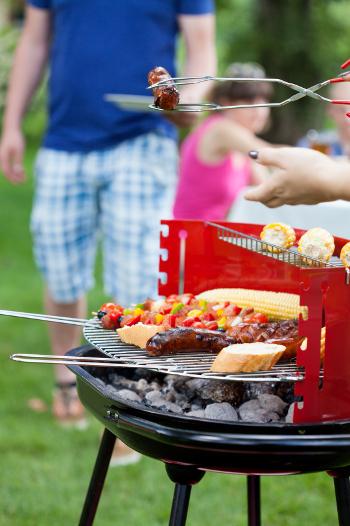It's barbecue time
Duration/age

The weather is fine, the days are long and the family is on holidays. If you have a barbecue everyone can help to prepare the meal. Maybe this time you could make kebabs.
Talk to your child about the different types of kebabs you can make. Will you use meat or vegetables or a mixture of both? Your child could help you to cut up the different ingredients and thread them on.
Before you get started making the kebabs talk about the different combinations you can make and how long they will take to cook. Explain to your child that thicker, denser ingredients will take longer to cook.
We need to cut all the ingredients the same size and shape so they will take the same amount of time to cook.
The meat will take longer to cook than the vegetables. We will need to cut the meat thinner so that it cooks in the same time.
Ask your child to help get the ingredients out and help with cutting up the food. Will you ask your child to make the same as you? They can follow what you are doing. Maybe you could let them make up their own combinations.
We are going to make chicken and capsicum and then beef and onion kebabs. You need to follow what I am doing.
Once you have finished and the food is ready to cook, set a timer so your child can watch the time count down till it is ready.
Materials you will need
- Chopping board
- Knife
- Kebab ingredients
- Barbecue
Alternative tools
- Frying pan
- BBQ grill
Skills this activity improves
Why does this matter?
When your child helps you to make kebabs they are listening to instructions and hearing and using the language of measurement. They are sorting and grouping the ingredients by colour, size and cooking time.
As they help to make the kebabs they are exploring the different language and ways we can measure. We can measure by:
- time - how long does it take to cook
- size - how big or small will we cut the pieces
- number - how many will we make
Grouping, sorting and creating patterns with the ingredients helps your child to develop keen observation and visual discrimination skills. Visual discrimination and observation skills are important for reading and writing and noticing the different attributes of an object.
What does this lead to?
Cooking and getting food ready to eat helps your child to develop good listening skills. Listening skills are important for following instructions and conveying information to other people. If children do not listen carefully when given instructions or information they make go to the wrong place, not be sure of what to do, or give the wrong information to another person.
As your child helps to cut, sort and group the ingredients they are learning to classify the ingredients and to use language to describe similarity and difference.
Language to use
- Time, timer, clock
- Barbecue, tongs, kebab
- Meat, vegetables, ingredients
- Thick, thin
- Size, shape, length, number
Questions to use
- What kinds of kebab are you going to make?
- Does the onion and the capsicum need to be the same size and shape?
- Will it take longer to cook if we cut the meat thicker?
- Should we make the kebabs all the same or lots of different combinations?
- How do we know when they are cooked?
Useful tips
- Use a different bowl for each vegetable. This will help your child to see the different choices.
- Offer the softer vegetables to your child to cut.
- If your child has difficulty making choices you can name the ingredient for them to find and they can thread it on.
- Remember to talk to your child in your home language.
More ideas
Make your own family cookbook. Include your favourite kebab recipes in it.
Variation by age
Three to five year olds
- Make a picture recipe of different kebab combinations for your child to follow.
- Get your child to help you plan the shopping list. Use the junk mail for ideas of different ingredients you could use.
- Make kebabs that have a repeated pattern.
- Sort the ingredients by colour.
Questions to ask
- How many different ingredients will we use?
- Can you find something that is the same colour?
- Which ingredients are thinner?
- What do you think will take the longest to cook?
Language to use
- Time, timer, clock
- Barbecue, tongs, kebab
- Meat, vegetables, ingredients
- Thick, thin
- Size, shape, length, number


